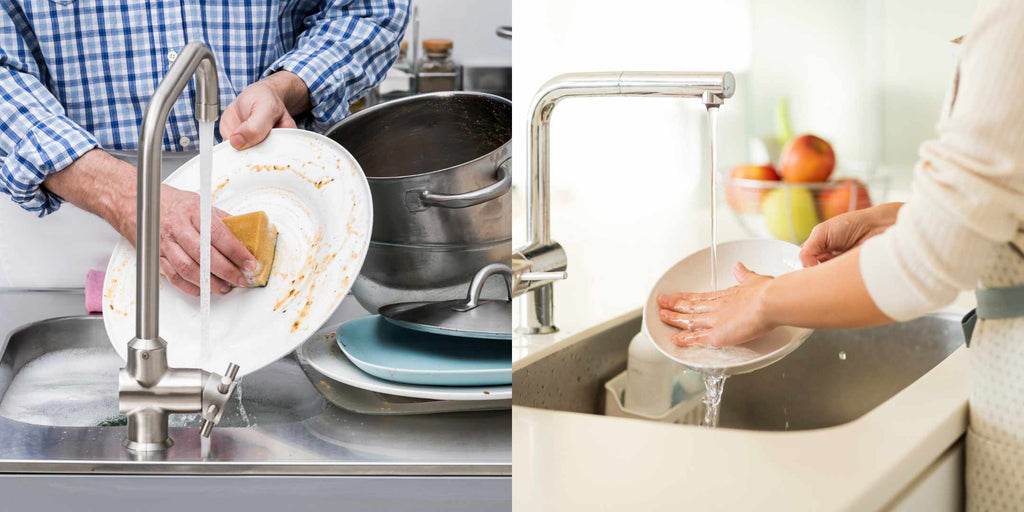Our best-loved kitchen appliances allow us to achieve multiple functions at home while improving our convenience. However, these functions and conveniences come with a price. Although modern appliances now offer more functions and are more energy-efficient, there are still many instances where time and money are wasted. As a result, many novel methods were developed and passed down through generations in the name of increasing appliance efficiency and energy savings. But are these hand-me-down appliance hacks really effective? Truth be told, some of the myths that we believe are more harmful to our kitchen appliances.
We’re about to bust some appliance myths and bad advice that fork over money and time. You'd be surprised at how many of these are found in most households.
Busting Kitchen Appliance Myths
Myth: You Should Rinse Dishes Before Running the Dishwasher

This has been a running routine in many households ever since. Surprisingly, rinsing the dishes quickly before putting them in the dishwasher can be counterproductive. Most dishwashers, especially modern units, work better when sensing food particles from the dishes. When the dishwasher senses a lower turbidity level in the water, the cycle will be shorter and the cleaning will be less efficient. Moreover, dishwasher detergents are designed to cling to food particles to work better. Overall, rinsing the dishes before running the dishwasher will give the appliance a cue that the dishes are already clean.
Aside from this, pre-rinsing your dishes wastes more water without achieving the desired results. To help your dishwasher work better, the best method is to scrape off the excess food debris from the dishes instead of rinsing them.
Myth: Washing Dirty Dishes By Hand Saves More Water

Many homeowners believe that they can save more water by cleaning the dishes by hand. This may make sense at a glance, but if you look closely, you will see that the traditional way of washing the dishes may consume more water than using a dishwasher.
A dishwasher can use an average of 3.7 gallons of water, equivalent to a full sink, which is significantly less than the amount of water needed to traditionally clean a pile of dishes. That being said, a dishwasher may only waste more water when you pre-rinse the dishes. In terms of electricity, dishwashers use an average of 1 to 1.5 kilowatts per hour.
Myth: Keeping an Old Refrigerator Can Save You Money

Our refrigerators have come a long way in terms of energy efficiency. Although not all smart refrigerator features are required or necessary for every household, models with improved energy efficiency are truly worth the investment. So, if you are planning to upgrade your refrigerator, start looking for a model with a higher NEA rating to guarantee energy savings.
Myth: Appliances in Standby Mode Don’t Use Electricity

The standby mode on appliances actually takes up a significant amount of electricity, especially when multiple kitchen appliances and gadgets are left on standby at the same time. In fact, a huge amount of electricity consumption in many households is caused by leaving appliances in standby mode. To save electricity, make sure to turn off and unplug appliances that you don’t use. You will surely see a huge impact on your electricity once you make this a habit.
Myth: Using Your Appliance Less will Prolong its Lifespan

Less use means less wear and tear, right? This may be true for many things, but this is not the case for many kitchen appliances. Some kitchen appliances are designed to be used frequently to prevent their components from becoming too dry and brittle. The best way to prolong the lifespan of your appliances is through regular cleaning and maintenance. It also makes a difference if you buy high-quality appliances upfront.
Myth: A Microwave Oven is Harmful

This is one of the oldest and most popular myths on this list, and we're here to dispel it. Ultimately, microwave ovens are safe and do not cause cancer. While it’s true that a microwave oven emits radiation, what it produces is non-ionizing radiation, which is different from those that are found in x-rays. This electromagnetic radiation is low in frequency and weak enough to not cause harm or negative health effects. Moreover, most microwave oven-related injuries are caused by the heat, not radiation exposure. If you safely follow the instructions to keep your microwave oven closed, you don’t have to worry about your safety while using one.
Myth: Self-Cleaning Ovens Don’t Need Manual Cleaning

This concept is also not true. Although modern self-cleaning ovens handle the time-consuming task of removing grit and grime from your oven, you will still need to do some manual cleaning. This includes the thorough cleaning of oven racks, doors, and other areas that you want to thoroughly clean. But rest assured that the self-cleaning feature will definitely do the heavier work, especially during busier days like weekends or holidays.
Myth: Cooking with an Electric Oven is Costly

Many home chefs are still reluctant to get an electric oven due to its possible electricity cost. But if ever you're thinking about getting one, we’re here to assure you of one thing: an electric oven does not consume as much electricity as you imagine. The refrigerator, which is a major kitchen appliance that runs 24/7, consumes a significant amount of electricity. However, the electricity consumption of an electric oven is only 8% of your total household electricity. More so, the convenience and outstanding results of using an electric oven are truly unmatched.
Takeaway

When investing in major appliances or medium-sized kitchen appliances, your goal is to experience convenience and maximum efficiency while reducing your expenses. While it’s understandable how the myths above were spread and followed, there is no denying that technology has already come a long way to address various concerns. Fortunately, modern technology continuously offers new ways to enhance functionality and energy efficiency without dreadful measures or significant health and environmental risks.










